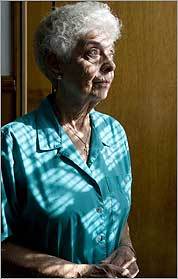 From our friend Camille D'Arienzo, RSM, who works with those on death row.
From our friend Camille D'Arienzo, RSM, who works with those on death row.
Attorney General Eric Holder’s decision to try the accused 9/11 perpetrators in a civilian court near Ground Zero has ignited a national debate over whether the accused Khalid Sheikh Mohammed and his companions should face a military or civilian court. Other concerns include the safety of the city, the opportunity for propaganda and the possibility of acquittal, based on waterboarding the men experienced in Guantanamo.
One matter not being debated is Mr. Holder’s determination to urge the prosecution to seek the death penalty for these mass murderers.
If the destruction perpetrated here had occurred in London, Paris, Rome or any other European city, the death penalty would not be debated either. It is not allowed in nations that form the European Union.
If the death penalty were forbidden here, life without parole would at very least deprive these mass murderers of presenting themselves as martyrs and us as their killers.








Furthermore, the prudential judgement aspect of the teachings also mean that good Catholics are free to provide their own judgement in calling for more executions, if their reasoning so finds.
While jailed, terrorists are likely to spread their brand of hatred and thus sow more seeds for murder and, therefore, even under the strict secular structure provided by the Catechism, we can see that such murderers still qualify for death, based upon the danger they still pose while alive.
There is also the problem of how many al Qaeda terrorists have escape from prisons in Iran and Yemen, as elsewhere, which exposes the Catechism's weakness in it's dependence on the state's secular imperfection of security.
"The Roman Catechism of the Council of Trent" (1566)
"The just use of this power (execution), far from involving the crime of murder, is an act of paramount obedience to this Commandment which prohibits murder. The end of the Commandment is the preservation and security of human life. Now the punishments inflicted by the civil authority, which is the legitimate avenger of crime, naturally tend to this end, since they give security to life by repressing outrage and violence. Hence these words of David: In the morning I put to death all the wicked of the land, that I might cut off all the workers of iniquity from the city of the Lord."
"PARAMOUNT OBEDIENCE" to God vs the newer Catechisms references to man's accomplishments with the criminal justice system.
"Death Penalty Support: Modern Catholic Scholars"
http://prodpinnc.blogspot.com/2009/07/death-penalty-support-modern-catholic.html
"Pope John Paul II: Prudential Judgement and the death penalty"
http://homicidesurvivors.com/2007/07/23/pope-john-paul-ii-his-death-penalty-errors.aspx
However, the majority of those living in European Union countries support the death penalty for horrible crimes.
That support is based upon justice.
Those favoring the executing of Saddam Hussein (French daily Le Monde, 12/2006{1}),
Great Britain: 69%
France: 58%
Germany: 53%
Spain: 51%
Italy: 46%
US 82%
We are led to believe there isn't death penalty support in England or Europe. European governments won't allow executions when their populations support it: they're anti democratic. (2)
(1) The recent results of a poll conducted by Novatris/Harris for the French daily Le Monde on the death penalty shocked the editors and writers at Germany's left-leaning SPIEGEL ONLINE (Dec. 22, 2006). When asked whether they favored the death penalty for Saddam Hussein, a majority of respondents in Germany, France and Spain responded in the affirmative.
(2)An excellent article, “Death in Venice: Europe’s Death-penalty Elitism", details this anti democratic position (The New Republic, by Joshua Micah Marshall, 7/31/2000).